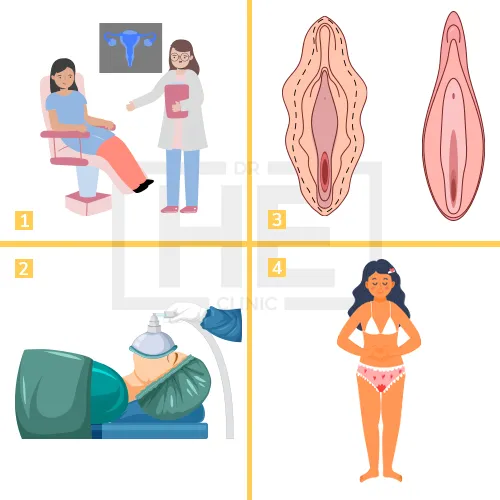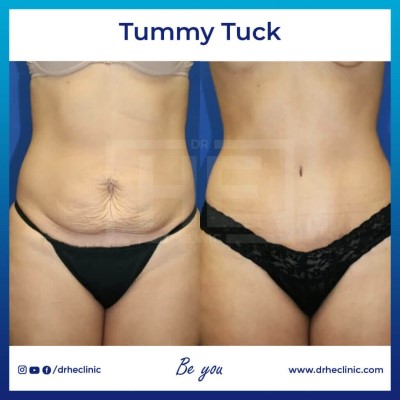What is Vaginoplasty?
Vaginoplasty in Turkey, like in many other countries, is a surgical procedure aimed at reconstructing or tightening the vaginal canal. It can be performed for both functional and cosmetic reasons. Here are some key points to consider if you are interested in vaginoplasty in Turkey:

Vaginoplasty Steps

Consultation and Evaluation: The first step is a consultation with a qualified plastic surgeon or urologist/gynecologist specializing in genital aesthetics. During this consultation, the patient discusses their concerns, desires, and expectations. The doctor evaluates the patient’s health, medical history, and the anatomical structure of the genital area to determine the feasibility and the best approach for the procedure.
Planning the Procedure: If the patient decides to proceed, the surgeon plans the procedure. This involves discussing the surgical techniques, the extent of the surgery, the expected outcomes, and potential risks and complications. The surgeon also provides pre-operative instructions.
Preparation for Surgery: This may involve medical evaluations, lab testing, adjusting current medications, and avoiding certain medications or supplements that can increase bleeding. The patient is usually instructed to stop smoking well in advance of surgery to promote better healing.
Anesthesia: Genital aesthetic surgeries are typically performed under anesthesia. This could be general anesthesia (where the patient is completely asleep) or local anesthesia with sedation, depending on the extent of the procedure.
The Surgical Procedure: The specifics of the procedure vary greatly. For example, in a labiaplasty, excess tissue from the labia minora is removed; in a phalloplasty (penile enlargement), various techniques may be used to enhance the length or girth of the penis.
Immediate Postoperative Care: After the surgery, there is usually a period of observation. When the patient is stable, they can go home. Instructions for postoperative care, including hygiene, activity level, medications, and follow-up appointments, are provided.
Recovery Period: The recovery time varies depending on the procedure and the individual. Patients might experience swelling, bruising, and discomfort initially. It’s essential to follow the surgeon’s instructions regarding rest, wound care, and when to resume normal activities and sexual intercourse.
Follow-up Appointments: Postoperative follow-up appointments are crucial for monitoring healing and addressing any concerns or complications.
Long-term Results and Care: The final results of genital aesthetic surgery may take several months to become fully apparent. Long-term care and observation might be recommended in some cases.

Need Help? Contact Us!
7/24 Obesity Help Desk
Intimate Surgery
Vaginoplasty Turkey Cost 2025
The cost of Vaginoplasty in Turkey in 2025 can vary depending on a number of factors, including:
- The type of procedure being performed
- The experience of the surgeon
- The location of the clinic
- Whether or not additional procedures are being performed at the same time
However, as a general guide, you can expect to pay between $1,200 and $4,390 for a Vaginoplasty procedure in Turkey.
| Region | Average Vaginoplasty Cost |
 Turkey Turkey | $1,200 – $4,390 or more |
 USA USA | $8,000 – $12,000 or more |
 Canada Canada | $8,000 – $12,000 or more |
 UK UK | £5,000 – £8,000 or more |
 Australia Australia | AUD 8,000 – AUD 15,000 or more |
 Germany Germany | €8,000 – €10,000 or more |
 France France | €7,000 – €10,000 or more |
Why does Genital Aesthetics Cost in Turkey Cheap?
- Exchange rate: Favorable exchange rates for foreign currencies relative to the Turkish lira can make procedures even cheaper for international patients.
- Standardized procedures: Many Turkish clinics employ standardized protocols and techniques for common procedures like tummy tucks, achieving efficiency and cost savings.

Vaginoplasty Before and After Photos
Submit your request for access to before and after photos to see actual patient results from our many cosmetic procedures and treatments at Dr. HE Clinic.
Vaginoplasty Reviews


Posted on
Truspilot
Posted on
TruspilotIs it Safe To Have A Vaginoplasty in Turkey?
Having Labiaplasty treatment in Turkey can be a safe and effective option for many individuals, provided that you carefully select healthcare providers and facilities. Turkey is known for its advanced healthcare services, especially in major cities like Istanbul, Ankara, and Izmir, where many hospitals and clinics cater to international patients.
Frequently Asked Questions About Vaginoplasty
Does Health Insurance Pay for the Vaginoplasty?
Whether health insurance covers Genital Aesthetics treatment depends on the policy and the country. Many insurance plans cover medically necessary treatments, which can include therapy and physical treatments for Genital Aesthetics, especially if it impacts physical health and well-being. It’s important to check with your insurance provider for specific coverage details.
How Long Does Vaginoplasty Take?
The duration of Genital Aesthetics and its treatment varies significantly among individuals, depending on factors such as the severity of the condition, the underlying causes (psychological, physical, or both), and how the person responds to treatment. Some individuals may see improvement within a few weeks or months of starting therapy, while others may require a longer period, sometimes even years, to fully overcome the condition.
Is Vaginoplasty Painful?
QUALITY CERTIFICATES
















Posted on
Truspilot